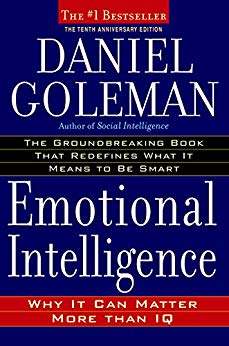

This article is an excerpt from the Shortform summary of "Emotional Intelligence" by Daniel Goleman. Shortform has the world's best summaries of books you should be reading.
Like this article? Sign up for a free trial here .
Do you feel angry all the time? Do you have anger issues and have angry outbursts? Do you want to stop being angry?
Here’s a complete guide on understanding your anger, what it is, how NOT to control your anger, and what to do.
Here are general rules for managing any negative emotion:
- Don’t dwell on the emotion and keep mulling it over. Ruminating on an emotion doesn’t manage it–it actually extends the emotional reaction and can even increase the emotional distress.
- Self-awareness helps you catch a negative emotional response early and identify it correctly.
- Most negative emotional responses are built on thoughts or assumptions that confirm the response–so you can manage almost any negative emotional response by challenging the thoughts and assumptions that made you feel it in the first place.
Understanding Your Anger
What Anger Is
We get angry when we feel attacked. It could be someone actively threatening our physical safety, dangerously cutting us off on the road, insulting us with words, or it could be something frustrating us in our pursuit of a goal. All these are perceived forms of attack, and anger is our brain preparing us to fight.
We’re also more prone to get angry when we’re more stressed. It’s much easier to shrug things off when your day is going well; if your day is going poorly, little things that might not even get to you on a good day can easily set off your temper.
How NOT to Manage Your Anger
The quickest way to continue feeling angry is to dwell on what’s making you angry. The longer we think about our anger, the more our brain comes up with self-justifications and good reasons that we should feel angry. Anger builds on anger. This is absolutely a bad way to deal with anger.
Say someone dangerously cuts you off while driving and you get angry. “What was that person thinking? They could have killed me. What would happen to my kids if I died? That person could have ruined my life and the lives of the people I care about! And for what? Probably for nothing. Where they’re going isn’t important enough to kill people for it. Jeez, no one pays attention to anyone but themselves anymore…”
Every subsequent angry thought after the initial one fans the flames, keeping you angry and sometimes even increasing how angry you are.
How to Control Your Anger and Stop Being Mad
The quickest way to manager your anger is to undermine the assumptions that are making you angry in the first place, usually by reframing the situation in a more positive light.
- For example, someone cuts you off in your car: the anger-inducing assumption might be that that person cares more about where they’re going than your safety, or that they chose you specifically to cut off, or even that they’re trying to anger you. You could try reframing your assumptions to curb your anger: maybe they didn’t see you, maybe there’s an emergency and they need to get somewhere.
Another way to deal with anger is to physically cool off. This is particularly useful in arguments: if you find yourself getting too angry with someone, get away from them to let your brain calm itself down before you do or say something you’ll regret. Removing yourself from the source of anger lets your body and brain wait out the surge of adrenaline that hits us when we get angry without having the target of the anger there in front of you.
- Active exercise helps release anger. Go for a long walk, a run, or a hike.
- Relaxation techniques like deep breathing and muscle relaxation help the body transition from the high arousal state of anger into a low arousal state.
- Distract yourself, as long as the distraction is pleasant (Shortform note: There are examples of pleasant distractions in last section on sadness).
You could also try writing down cynical, hostile, or angry thoughts as they arise. This will help increase your self-awareness and give you an opportunity to challenge those thoughts, thus decreasing the anger. Once you’ve written them down, you’re forced to look at them and assess them, and you have a better chance of reappraising the situation–but only if it’s in the earlier stages of anger. If you’re in a fit of rage, an exercise like this will probably fan the flames.
Managing Angry People
Have to deal with anger issues from someone else?
Someone at the peak of their rage is the most difficult person to manage. Data suggests a strategy to deal with someone in a fit of rage:
- Distract them.
- Empathize with their emotions and viewpoint.
- Draw them into a different, more positive focus.
> Example: On a train one night, a drunk man started yelling at everyone, threatening them, and trying to destroy parts of the train car. Nothing seemed to work to stop him until an old man distracted him by greeting him as a friend and asking what he had to drink. The man had sake, and the old man talked about how much he and his wife love sake and how they drink it every night in their garden. Then the drunk man broke down: his wife had died recently, and he’d lost his job and his home because of his grief. Goleman calls this an act of emotional brilliance on the part of the old man.
———End of Preview———

Like what you just read? Read the rest of the world's best summary of Daniel Coleman's "Emotional Intelligence: Why It Can Matter More than IQ" at Shortform . Learn the book's critical concepts in 20 minutes or less .
Here's what you'll find in our full Emotional Intelligence summary :
- What are emotions? Why do we have them?
- What is emotional intelligence? Why is it important?
- How do you manage your own emotions? Anger, anxiety, and sadness?
- How can you approach your relationships with more emotional intelligence?
- How can you teach your children emotional intelligence?
- How can emotional intelligence boost your career?






